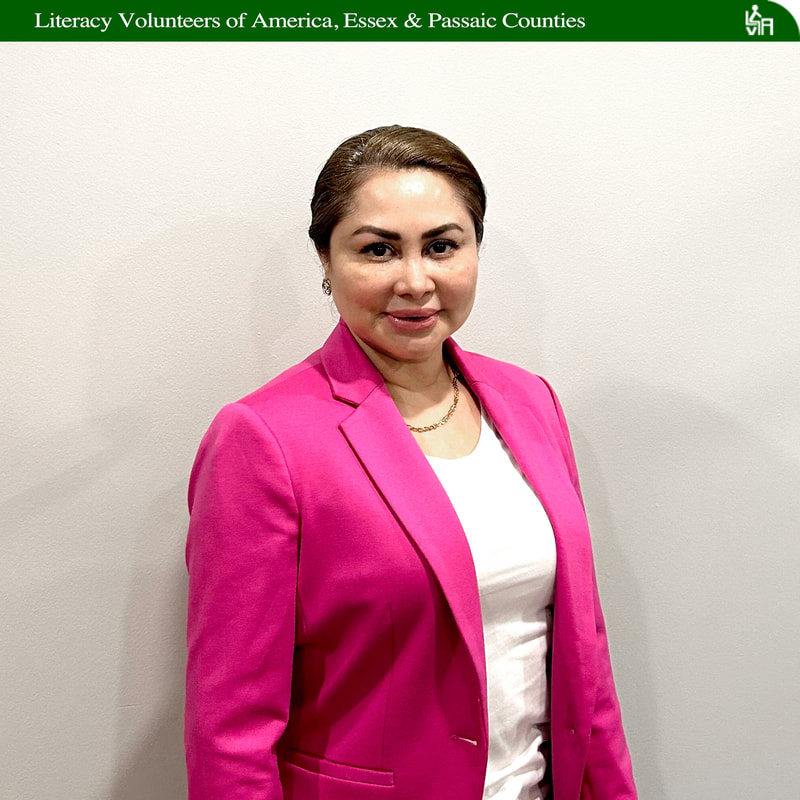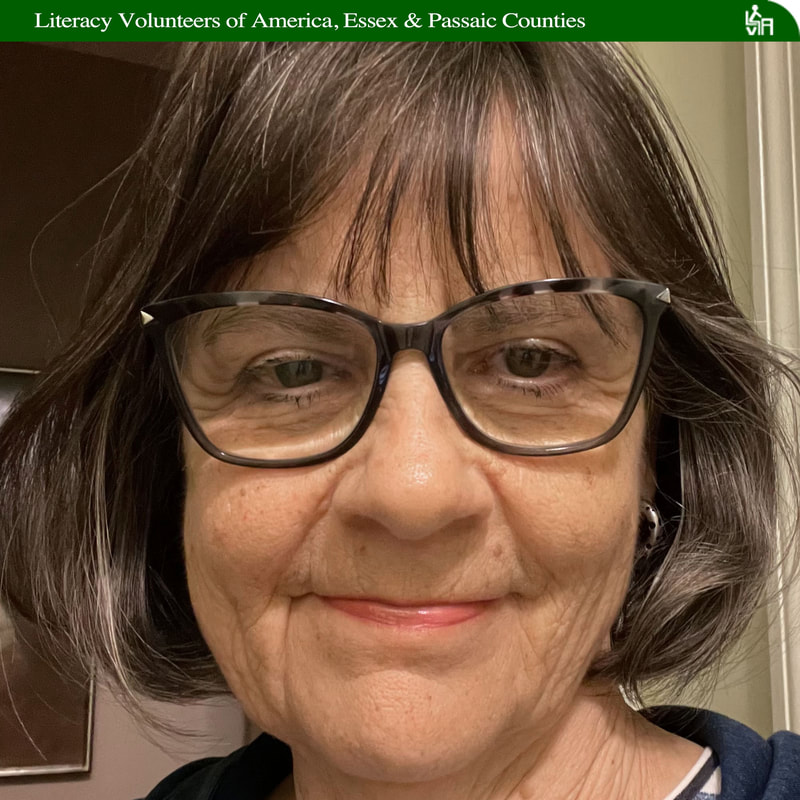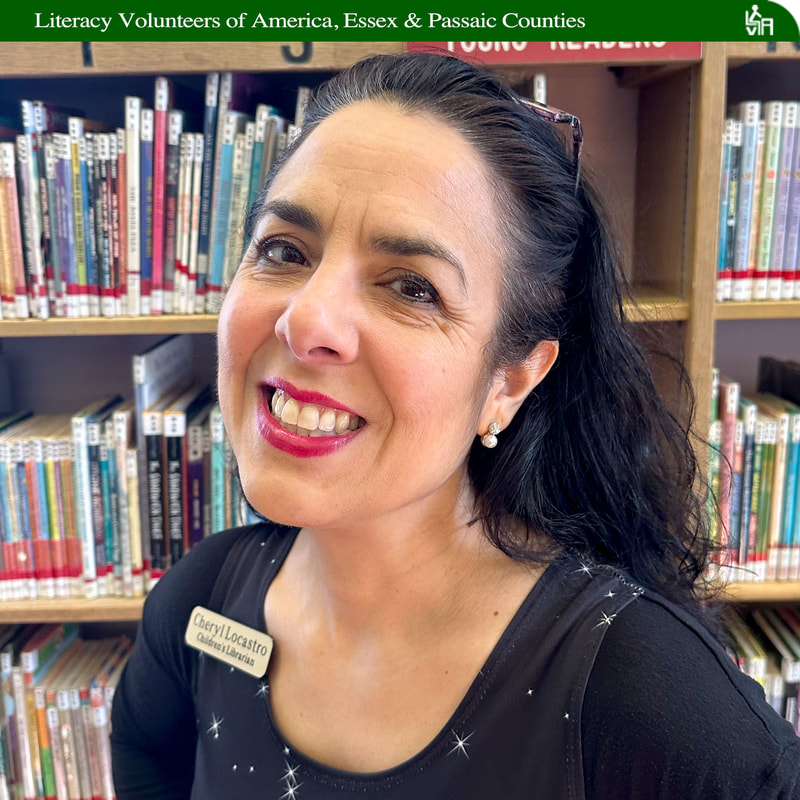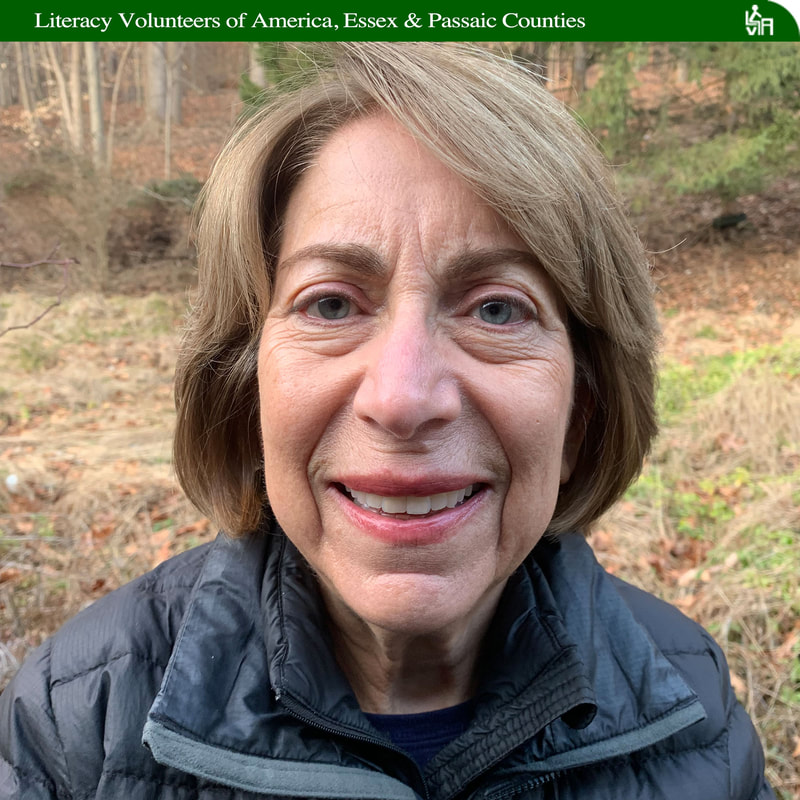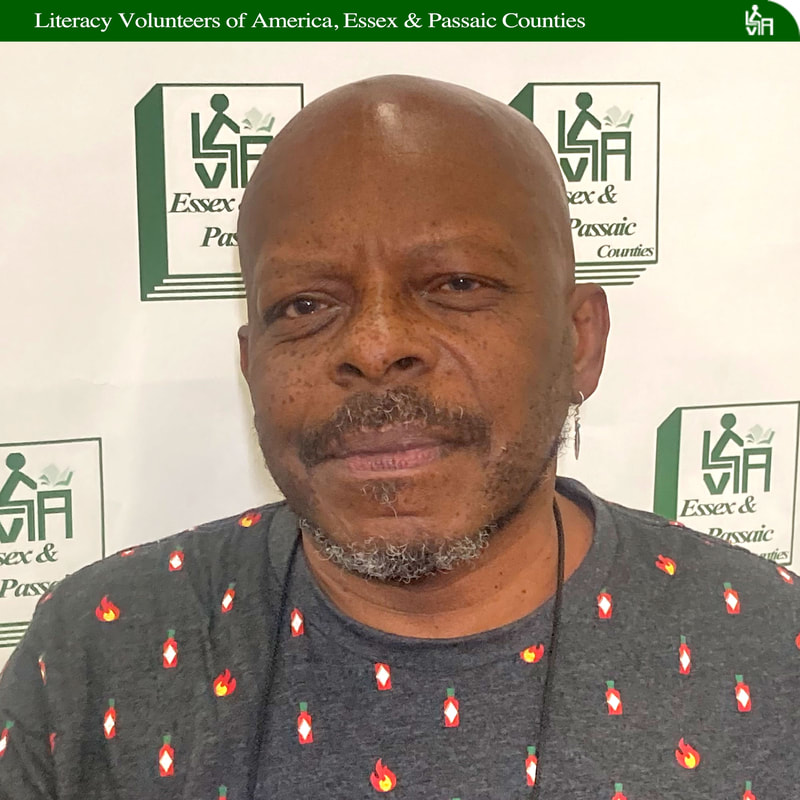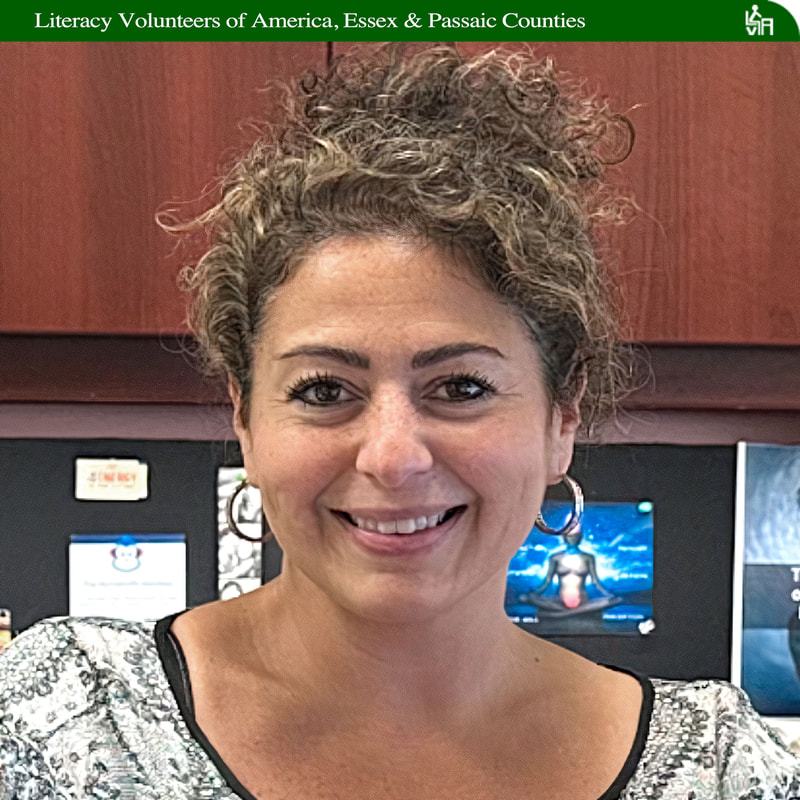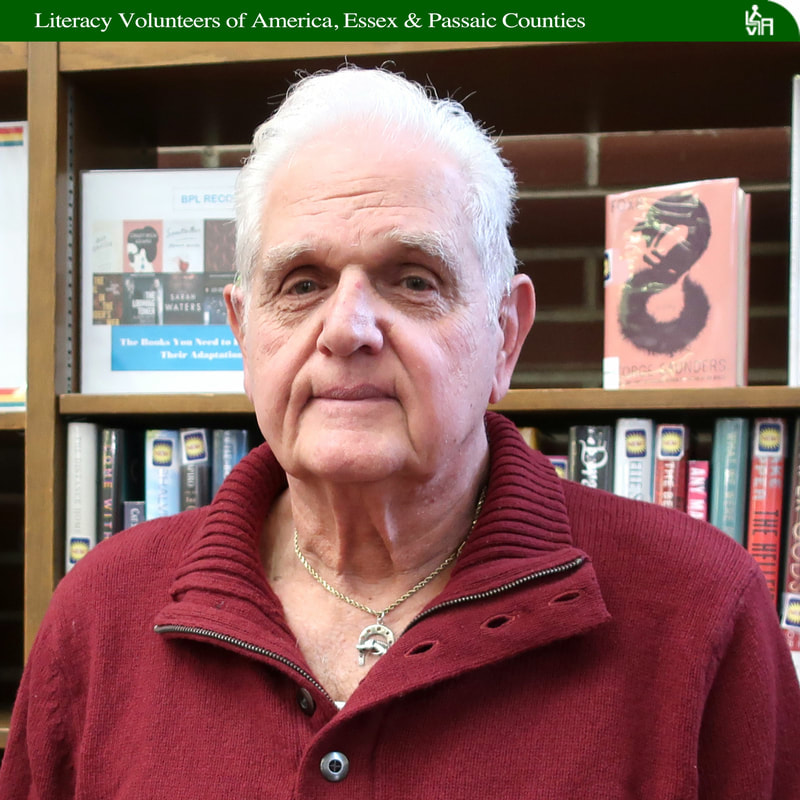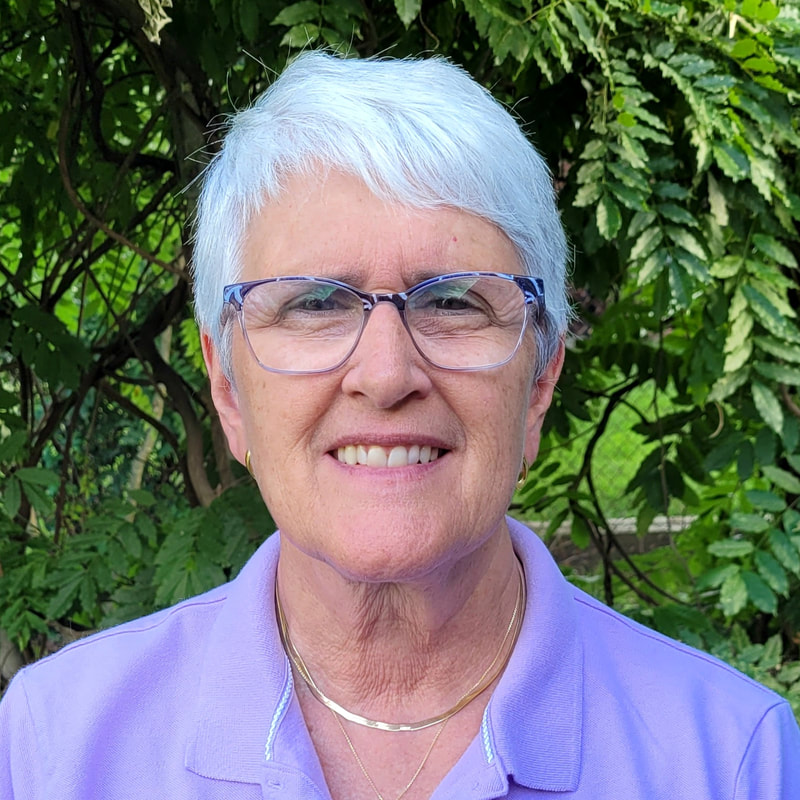Volunteers' Stories 2022-23
Everyone has a story, unusual, exciting, different. Many of them are just waiting to be read by others. From the front lines in Bosnia to the front office in Manhattan, Literacy Volunteers of America tutors come to us with fascinating backgrounds. We are proud to share the highlights of these amazing individuals who bring their varied experiences to our students.
Enjoy reading about people like the former missionary who provided medical supplies to remote villages, retired business people, lawyers, healthcare providers, college students, building for the future, who generously share their wealth of newly acquired knowledge, and even mothers whose role as primary as caregiver for their children willingly juggle home life, work as well as tutoring.
Enjoy reading about people like the former missionary who provided medical supplies to remote villages, retired business people, lawyers, healthcare providers, college students, building for the future, who generously share their wealth of newly acquired knowledge, and even mothers whose role as primary as caregiver for their children willingly juggle home life, work as well as tutoring.
Mariella AndradeMariella Andrade's journey from Riobamba, Ecuador to the United States was fueled by hope and the desire for a brighter future. She arrived two decades ago, leaving behind her aspirations to become a social worker, as her father had insisted on her becoming a lawyer.
Settling in Chicago on a study program, Mariella faced an immense linguistic challenge with the English language. Frustration and shame consumed her, and she eventually abandoned her studies. Determined to make a life for herself, Mariella threw herself into work, holding down three jobs, and was convinced she could not learn English. As years passed, Mariella found solace in becoming a wife and mother to two beloved sons. Yet, a void persisted in her heart and mind, longing to nurture her intellectual curiosity and thirst for knowledge. During this search, Mariella discovered LVA, the Literacy Volunteers of America, in New Jersey around 2013-2014. There, Mariella met her tutor and cherished friend, Judy Tabs, a retired school principal. Recognizing Mariella's potential, Ms. Tabs provided unwavering support, reminding her of her professional background and instilling confidence. Beyond traditional tutoring, Ms. Tabs took Mariella to coffee shops and outings, helping her practice everyday English conversations. This transformative journey healed Mariella's self-doubt and reignited her passion for growth. Despite Mariella’s fears, Ms. Tabs encouraged her to pursue higher education, believing in her abilities. Embracing the opportunity, Mariella enrolled in college to study Spanish education, graduating proudly in 2011. Later, she changed her major to become a social worker, earning her bachelor's degree in 2018. Hungry for knowledge, she obtained a master's in clinical social work in 2020. The transformation in Mariella's life was not limited to personal growth. It extended to her professional journey as well. Today, she works as a bilingual social worker at Catholic Charities, serving as a case manager for the Safe Passages Program. In this role, she supports immigrant children who have traveled through the Mexican border, lending a compassionate hand to those in need. Mariella's professional journey flourished as she became a bilingual Case Manager at Catholic Charities, supporting immigrant children who traveled through the Mexican border. Her story highlights the power of support, compassion, and belief. Through Ms. Tabs' guidance, Mariella transcended her self-imposed limitations, becoming a source of inspiration and assistance to others. Reflecting on her experience, Mariella understands the importance of nurturing dreams, even in adversity. She joined LVA's board of trustees to contribute and provide learning opportunities to those facing similar struggles. Her story exemplifies resilience and tenacity, reminding us that we can overcome barriers and achieve greatness with the right support. Mariella's journey inspires, showcasing the transformative power of education, compassion, and self-belief. It serves as a beacon of hope for countless individuals who may find themselves on a similar path. |
Jalaire CraverIn 2010, Jalaire embarked on a journey to give back to her community and stumbled upon an article about the Literacy Volunteers of America (LVA) in her local newspaper. Intrigued by the organization's mission, she got involved. Initially starting as a volunteer tutor, Jalaire's passion for empowering others through education led her to become a part-time teacher.
Before joining LVA, Jalaire had diverse life experiences that now inform and enrich her interactions with students. As an entrepreneur, she had ventured into two business endeavors navigating the intricacies of the professional world. Additionally, her time spent living in Mexico, where two of her children were born, and France, contributed to her global perspective and cultural sensitivity. In one memorable encounter, Jalaire asked a student about his goals for the class, and the response she received left a lasting impression on her. The student simply stated, "to show up!" Recognizing the significance of consistent effort and dedication, Jalaire emphasizes the importance of active participation and hard work in the learning process. With patience and a touch of humor, she creates a safe and supportive environment where students feel comfortable making mistakes, fostering their self-esteem and facilitating their progress. Through her years of teaching at LVA, Jalaire has witnessed the immense sacrifices made by parents to ensure a safer and brighter future for their children. She admires the unwavering determination and resilience displayed by mothers and fathers, who go to great lengths to provide their children with opportunities and access to safer environments. Many of the adult students she encounters at LVA are driven by a desire to improve their English and literacy skills, not only for personal and professional growth but also to better support their children's educational journeys. While Jalaire cherishes the meaningful connections she forms with her students, she also takes pride in addressing their specific language challenges. She understands the importance of mastering the nuances of the English language and guides her students in the proper usage of words like "do" with its various connotations. Furthermore, she has noticed that the word "bus" poses a pronunciation challenge for many learners, and she goes above and beyond to ensure their pronunciation skills are honed. Originally from Ohio, Jalaire has an academic background in plant science and horticulture, specializing in native desert plants. Jalaire's innovative spirit and love for nature led her to design and implement a garden and greenhouse program at Mt. Hebron Middle School. For Jalaire, teaching is a source of joy. She eagerly looks forward to each teaching session, knowing she can make a difference in her students' lives. |
Cheryl LocastroIt was a casual encounter to start, the kind where a teacher happily catches up with a former student and her family during a chance meeting.
But it ultimately surprised Cheryl Locastro, a former grade and high school art teacher, now a librarian who also teaches an adult ESOL class. And, as they chatted at the Bloomfield Public Library, where Cheryl is the head of Children’s Services, the young girl wore a huge smile as she suddenly blurted out “You’re my dad’s teacher,’ ” Cheryl recalled. “And then it clicked, that her father’s in my session,” she explained, a reference to the online English for Speakers of Other Languages class she teaches which the girl’s father, a native of Ecuador, attends. “And her mom chimed in and said ‘Thank you so much for everything you do to help our family’ ” Cheryl added. “And it just knocked me off my feet. It was amazing. This little girl was so happy, so proud. I told her what a great student her father is. It’s a circle. Everything is connected.” The class is part of a program run jointly by LVA and the Maplewood Memorial Library. LVA offers similar classes, evenings and mornings, with two public libraries in Passaic. Even in beginning level classes, adults report advances that have led to better communication with their children’s teachers, family doctors, and employment or higher paying jobs, things that benefit the entire family. Cheryl’s online students are no different. They’ve said that they were able to shop more efficiently and comfortably at supermarkets, pharmacies, and clothing stores, even returning purchases when necessary. They were better able to ask directions and complete other everyday activities, all positive feedback for a lifelong learning advocate like Cheryl. “To be honest, I had no idea I would enjoy it as much as I have,” she said of her adult class. “I mean, I knew I could do it but I had no idea how rewarding it would be.” Cheryl, a Nutley native, earned a Bachelor of Arts degree in art education from Rowan University, a master’s in art history from Montclair State University, and a master’s of library and information science from San Jose State University. As the head of children’s services, she supervises and manages all workers in the Bloomfield Public Library’s Children’s Department, builds partnerships with local organizations, and creates and oversees programs for children from birth to age 12, including the library’s arts and crafts programs and the popular Storytime program. “I enjoy planning programs for kids,” she said of her day job. “I enjoy finding new and exciting and fun stories to share.” |
Wendy SobelmanAlmost as soon as they’d met, tutor Wendy Sobelman came up with the perfect solution to supplement her literacy students’ education: computer-based learning.
But getting it to her students would take a family-sized effort. First of all, a license to use this computer program, which is built on the science of reading, is costly. Secondly, it requires a computer, and not all of her students owned one. And lastly, it would take some training to operate both the computer and the program. So, Wendy, with help from her family, went to work. As a retired special education teacher with a specialization in teaching reading to dyslexic children, as well as deaf children, she was well-familiar with the reading program; she’d used it for years. So, she contacted the program’s parent company and asked it to grant her students free access for one school year. “The woman I spoke to was really terrific,” Wendy said. “She got what I was trying to do.” Next came the hardware. “When I had my first lesson with my students, I asked ‘Are all three of you on a computer?’ ” Wendy recalled. “I had things that I wanted to do with them that required a computer, like sharing a screen. Two of them said to me ‘We’re on our phones, we don’t own a computer.’ I thought ‘this is going to be a problem.’ ” Her daughter-in-law came up with a solution. She appealed for help online and, through a web page designed for working moms, help arrived. “She got me two computers within two days,” said Wendy, adding that these were high quality laptops. “People just donated them, which was amazing.” Next Wendy, whose group met virtually, arranged an in-person session at the Irvington Public Library where her husband taught the students how to use the laptops. Wendy then demonstrated how the reading program worked. The program permits her students to work independently between sessions, allows her to monitor their work and print out progress reports. Wendy is a Philadelphia native. She has a bachelor’s degree in speech pathology and audiology from Penn State University; a master’s degree in deaf education from Temple University; and a doctorate in applied psycholinguistics from Boston University. In addition, she earned a certificate in special education from Southern Connecticut State University. She has taught at the Pennsylvania School for the Deaf in Philadelphia and was an assistant professor, teaching deaf education, at Trenton State College, which is now The College of New Jersey. She later taught special education to grades K-3. She and her husband moved to New Jersey from Connecticut two years ago to be closer to their grandchildren, with whom she spends much of her spare time, even running the lunch program at their school. In retirement she opted to volunteer at LVA in order to put her teaching skills to productive use. “It’s been really very rewarding,” she said. “I have learned a lot from my students about teaching adults. It’s different from teaching students.” Unfortunately, after nearly a year working together, her group has dwindled due to student scheduling conflicts. But her remaining student, a middle-aged, native English-speaking man from Trinidad and Tobago, is determined to learn. “He wants to get his GED,” Wendy said. “He’s working two jobs – at Amazon and doing painting and house construction. It’s amazing to me. He’ll get home at 4 a.m. in the morning and get up and work with me from 11 to 1. It means so much to him that he makes time.” |
Howard GardnerLong before he became a literacy volunteer, Howard Gardner began writing poetry and performing his verses in public while accompanied by a guitarist, and, occasionally, by a drummer or cellist.
In fact, Howard, who joined LVA in 2010 after retiring as a Los Angeles public school English teacher, has brought his distinctly deep and clear voice to way too many coffee houses, taverns, and auditoriums to list. But there’s one performance that this Montclair native likely will never forget. That was back in April 1999, when Howard took the stage at UCLA’s Royce Hall, an iconic concert venue that has hosted show stoppers like Ella Fitzgerald, Frank Sinatra, Leonard Bernstein, Wynton Marsalis, among others. For two amazing nights, dozens of renown jazz artists gathered at the university to commemorate the 100th birthday of the late jazz pianist and composer Duke Ellington. Howard, who performed a special piece that he’d composed from Ellington’s spoken word song introductions, was accompanied by a talented UCLA all-star band. The band was led by the school’s jazz studies program director, Kenny Burrell, known today as a Grammy award-winning musician and one of the world’s best-known jazz guitarists. “The other cool thing was, when I left the stage, Clark Terry was in the audience and he complimented me,” Howard said, as he recalled a brief encounter with the famed trumpeter, who would go on to earn a Grammy Lifetime Achievement Award. He doesn’t remember Terry’s exact words – possibly “Nice job” or “Right on” - but no matter; it came from Clark Terry! Howard’s readings are generally two-to-three minutes long and most likely fall into the category of modern style poetry. His work has been published and plans for a professional recording are on the horizon. Howard, a graduate of California State University, Los Angeles eventually returned east to care for an elderly parent. Around the same time, more or less, he became a volunteer tutor and today leads a group of four adults who hail from various Latin American countries. It’s an intermediate-level group and together they work on grammar, with some emphasis on things like the verb ‘to be’, as well as vocabulary, reading comprehension, conversation and other areas of language study. It’s an intermediate-level group, able to take turns reading in class from books like The Bluest Eye by Toni Morrison and The House on Mango Street by Sandra Cisnero. Howard enjoys working with groups and prefers in-person instruction to virtual classes. Not to mention that working with adults is an interesting change. “They’re motivated to learn,” he said of his adult students. “They don’t have to be there. So there’s very little classroom management.” |
Renee PorcileMaking mistakes in Renee Porcile’s language classes is entirely permissible. Apologizing for them is not. And she’s quick to remind any student who forgets.
“I urged them to stop saying ‘I'm sorry’ after every mistake they made, and insisted there was nothing to be sorry about,” Renee said of her group, which consists of five adult students from Latin America and Africa. It’s just a gentle reminder, as anything more could risk the judgment-free mood she’s worked hard to set for the group. “I found in most of my five students that I had the opportunity of spending time with, that the knowledge base was there, they just didn't have the confidence to vocalize or they were so nervous that they forgot what they had learned,” she said. And her students get it. “She’s friendly and has created a good atmosphere for a class,” said Evangelina, a student from the south of Venezuela, who added that Renee comes to class well-prepared and presents her lessons well. “I think she is not only a good teacher but a good person too.” We chatted with Renee via telephone and email. She’s a Bergen County native, we learned, with a Felician University degree and a Cornell University certification in Labor Relations. She has worked in the human resources field for nearly two decades and, when she’s not working or tutoring, likes to meditate, travel, and read. When she is tutoring, which she began doing earlier this year, she seeks to help her students develop their literacy skills while giving them the support they need to speak confidently. Along the way, they’ve logged plenty of hours working on grammar, reading, and comprehension with the help of English for Everyone practice books and grammar guides and materials found online. “My goal was to develop a relationship with each of my students to let them express themselves freely in a safe environment,” Renee wrote. “I would always start by opening myself up to be vulnerable with my students as an invitation for them to allow themselves to do the same at every session.” The good news is they no longer need much of an invite. “Most of them started volunteering to read or to answer questions without even being called upon,” Renee wrote. “To me, that was so rewarding just to know they were, not only learning something but becoming comfortable with their new language.” |
Bob BounczeckBob Bounczek has seen dozens of English language learners pass through his weekly conversation group classes over the years, some remaining only until they’d found work while others stayed on.
Student turnover can be frustrating for tutors at times but Bob, who understands the complexity of students’ lives, feels positive about helping, no matter how long. And he’s been at it a long time. “So many people that come to class have come to this country for the right reason, they wanted to send money back home,” said Bob, who became a volunteer literacy tutor in November 2004. “They came here because they wanted an opportunity and, to me, I can’t explain how that makes me think and how that makes me feel. Bob, 86, is a retired warehouse boss, a husky 6’2” tall figure of a man who was raised in Newark’s Central Ward. At work, he rose to the position of warehouse manager and was responsible for some 40 union laborers and three supervisors. When he’s not tutoring you might find him following another of his passions: horse racing. He is a prolific student of the sport and an experienced gambler. “I think I was 15-years-old when I sent for information on how to handicap,” he said with a laugh. “I put a lot of time into it but I approach it the same way I did my job. I try to understand everything I can about it because I’ve read everything.” When it comes to tutoring, he’s strictly old school: He favors the use of a physical dictionary for vocabulary work and endorses in-person meetings. When the pandemic forced the closure of the Passaic Public Library, where he’d long led his conversation groups, Bob shunned online options and instead moved his groups to a local Dunkin’ Donuts restaurant. Today, his classes meet at the Bloomfield Public Library twice per week, with eight students in total. He is one of our longest volunteering tutors and, after all these years, says he is still inspired by his students. He describes himself as being “lucky” in life, never really having to struggle to make a living or such, and has found a good way to give back to others. “I will do everything I can within reason to help,” he said. “That’s what keeps me coming back. Plus, the fact that I’ve met some really nice people, honest people, and to me honesty is a big deal.” |
Caryn LevineCaryn Levine’s students come from different countries, speak different languages and are vastly different in age. But they do have this in common: They love a good challenge.
And that’s just fine by Caryn, who enjoys probing their limits with news stories and readings that demonstrate how much they know. “Sometimes I’m really impressed,” said Caryn. “For example, last week one of the vocabulary words was exacerbate and they knew what that meant. So their vocabulary is pretty advanced.” Caryn is an Essex County native and a former hospital dental hygienist who became a tutor after she retired a little more than a year ago. Volunteering had been on her radar for a while, said Caryn, a professed reading and English language enthusiast who has already read 16 books this year. “It’s just something that was so important to me that I wanted to be able share that with some people who were also interested in it,” Caryn said. “It’s very fortunate that the students that I have right now really enjoy the idea of being challenged and learning more and, you know, broadening not just their English but their interests.” One of those students, Haeckel, a native of the Brazilian state of Bahia, said Caryn’s sessions provide a wealth of cultural, news, and other information. “She makes it easy to understand how things work in this country,” Haeckel said. “Because in my country some things are different from here.” Outside of her online classes, Caryn spends much of her time caring for an elderly mother and, as often as possible, visits her three granddaughters, ages 4-6-years old, who live about an hour away. She also works with needlepoint and does yoga nearly every day. For her literacy classes she keeps a file folder of every lesson she’s ever conducted with her students. “So if I ever end up having different students I can always go back to some previous lessons, ones that worked and didn’t work.” She also keeps a journal every week which includes notes on what her students liked or did not like, and what they did well on or didn’t do well on. She said she completed training, believing that she would be assigned a basic literacy student, rather than speakers of other languages. “I have found that to be even more interesting,” Carayn said of her ESOL group. “I’ve taken a lot of workshops and I’ve learned a lot of things. And I’ve found that to be very rewarding.” |

